Actively managing sustainability
The sustainability management serves the purpose of systematically and organisationally anchoring the notion of sustainability in our core business operations and to consider the interdependencies between economic, environmental and social aspects in an efficient, solution-oriented manner. It is closely tied to our risk and opportunity management system via the formalised reporting and evaluation of sustainability-related risks and opportunities. This enables the Management Board to systematically identify, evaluate and control deviations from the sustainability goals and the ensuing risks and opportunities. We did not identify any material risks.
The Sustainability Committee establishes the strategic framework and sets goals that are applicable throughout the group. To adequately respond to the specific market and customer requirements, the METRO companies manage the operational implementation of the sustainability notion within this framework. They are responsible for working on the relevant sustainability issues, for defining specific targets and measures and for monitoring their success. They report on current developments and achieved progress to the Sustainability Committee.
The committee is chaired by 2 representatives from the top management of METRO, who are regularly exchanged. Other members of the committee are:
- People in charge of corporate responsibility at METRO AG
- Representatives of the core functions purchasing, own-brands, communication as well as investments and technical solutions
- Representatives of Real
- Representatives of the METRO Wholesale national subsidiaries
Ad hoc expert groups prepare specific issues on the operational level and then present them to the Sustainability Committee for a decision. Depending on the issue, participants include experts from Real, the METRO Wholesale national subsidiaries and the head office.
The round table on corporate responsibility, which comprises participants from the sustainability units of METRO AG, the sales lines METRO Wholesale and Real together with the service companies METRO-NOM, METRO LOGISTICS and METRO PROPERTIES, forms another interface between the strategic and operational levels of sustainability. This corporate body serves the exchange of information and, together with the ad hoc expert groups, assists in implementing the decisions made by the Sustainability Committee. Individual services with which the sales lines contribute to achieving the sustainability goals at group level are coordinated in a round table. For example, when the participants are able to exchange views on how they assess and deal with specific topics, synergies will emerge which the operational divisions can use to manage their specific issues.
In addition, we embed sustainability aspects into relevant business processes and decision-making procedures, including guidelines such as the sustainable procurement guideline, and involve our employees, for example via our Sustainability Day or through information on METRO’s social network platform. Our goal is to make it possible that all individuals acknowledge the significance of sustainability with respect to both themselves and their professional environment, and that they conduct themselves accordingly. For example, we contribute to this goal through our principles, self-commitments and positions that provide directional guidance and include compliance with laws as well as meeting additional requirements. Another measure is the METRO Sustainable Leadership Programme, our ambassador programme for leadership development. While METRO may be able to drive the issue in a top-down approach, each of the more than 150,000 employees should take it to heart to effectively contribute to our impact on sustainability.
Our stakeholders evaluate the sustainability measures implemented by us, for example, through ratings. These evaluations by independent third parties provide important motivation to us and serve as a management tool, because they demonstrate the progress of and potential to improve our activities. An example of this is the linking of the remuneration of the Management Board and the global senior management to the valuation of METRO’s sustainability performance in the rating of the Dow Jones Sustainability Index (DJSI).
Oekom Research (now called ISS-oekom) awarded the prime status C+ (on a scale from D- to A+) to METRO in August 2018. In addition, we topped the Food & Staples Retailing group for the fourth consecutive time in financial year 2017/18 in the internationally important sustainability indices Dow Jones Sustainability World and Europe. METRO is also listed in the FTSE4Good index. METRO has been issuing public statements on climate protection and water for many years through the Carbon Disclosure Project (CDP). METRO achieved a rating of A- (on a scale from F to A) for both subject areas.
Embedding sustainability
